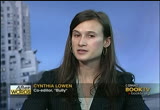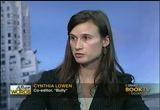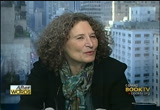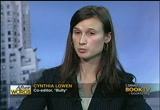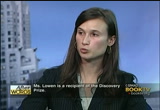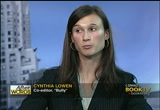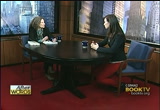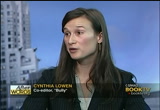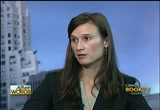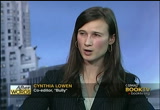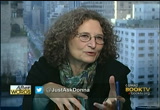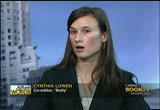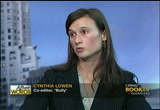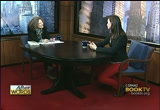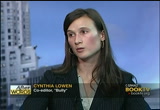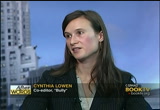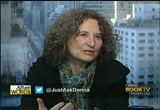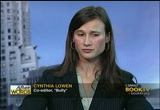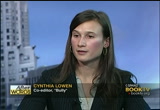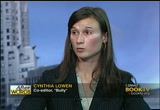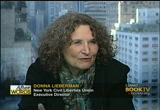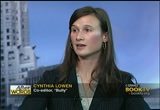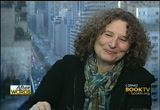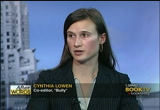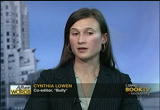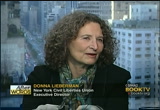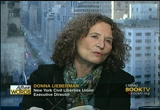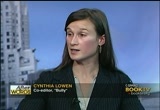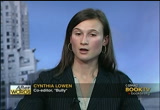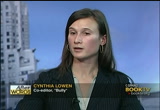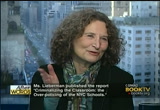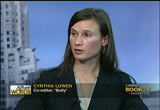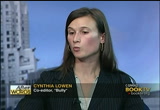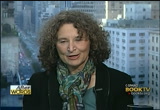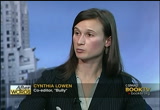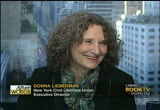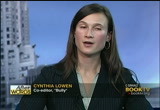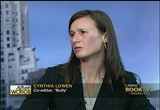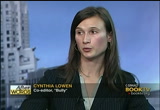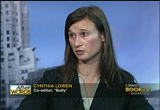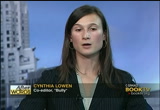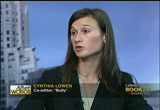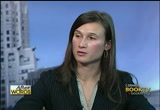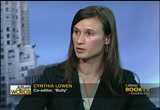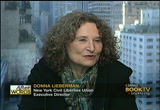tv Book TV After Words CSPAN December 16, 2012 9:00pm-10:00pm EST
9:00 pm
guest host and i believe in magic and the executive to return of the new york civil liberties union donna lieberman. this week cynthia lowen and her book bully. in that ms. lowen goes beyond the documentary film and presents personal stories and essays from antibullying activists and experts on how to stop the epidemic of bullying in the u.s.. ..
9:01 pm
9:02 pm
out and talking about the experience of this phenomenon that so many of us have experienced in one way or another and had i have no words for it, other than adolescence. other than going out. finally, people were starting to stand back and say that this is not actually a normal part of growing up. this is not a normal rite of passage. i think there was a moment where there is a possibility for change. the director, lee hirsch and i started talking about this. voices started bubbling up to the service. this is not something we can expect from a normal culture. in april of 2009, it was right after to young people took their lives. both of those tragedies, i think really ignited a national
9:03 pm
recognition of what was going on for so long. and we were seeing parents writing into message boards. we were seeing every news story that. hundreds of comments from parents saying that my child is going through this. kids thing that i'm going through this and i feel hopeless and helpless, and i don't know what to do. educators writing an insane that we don't know how to handle this. we don't have the tools to responsiveness. and we decided at that time to start moving the kids who are on the frontlines of this relationship. >> host: so what is the difference between teasing and bullying? is everything bullying that happens back to a child? or is it something like a definition of a bullying that
9:04 pm
really works? >> guest: everyone will be teased him on. we all realize that. there are things that are good-natured and teasing is are part of weight of commuting with each other. there is will be times when there is violence or two kids in a fight. that is not necessarily bullying. it is bullying when there is no difference in power. when the target does not have the ability to make a stop. when there is something going on over time. continued abuse. in the end game is to delete them and humiliate them.
9:05 pm
>> host: is bullying something that is just about words? is it isn't just physical? is a combination? >> today, we are seeing all kinds of forms. bullying is worse than ever before. we have heard a lot about cyberbullying. ways in which bullying is occurring in many different contexts. while that is absolutely significant as far as a piece of the picture, the good, old-fashioned bullying is still quite alive and well. so i think that it is something that is happening. physical interactions, we see a child who every time it's on a school bus, he is pretty likely to know that he is going to be shoved by someone. he is going to be pushed by
9:06 pm
someone. he may be pushed out of his seat. he is going to cure things. people are going to call him names. i think that that is something that is very prevalent in our society. it can be ostracization. they can be everyone throwing a party and somehow you are made very aware that you were not invited to this. it is a social exclusion that is a big part of it. again, online, text and pictures and spreading rumors. so i think that it takes a lot about different forms. the reason it is so hard to work out is that it is about social dynamics and social hierarchy. there are relationships between children and adolescents, particularly in middle school, where they are jockeying for power, they are figuring out
9:07 pm
official use of power. it is complicated. the child who may be in the most popular crowd, they could be the same person that gets bullied on the bus. it has a lot to do with the group and this is ever-changing. this is part of what makes it not just one kind of thing that is bad and we need to stomp out where every we see it. we have to understand what is taking place among kids were very sophisticated and a lot of understanding about who has power and who doesn't. >> host: how prevalent is bullying? can you give us some information about how children generally faced bullying? also whether there are special populations of kids who are particularly vulnerable? >> absolutely. we know that 13 million kids
9:08 pm
will be bullied in the united states. this year. that is a lot of kids. we know that kids who are lgt -- kids that are lgbt. >> host: kids that are identified that way? >> guest: yes, absolutely. that is another big part of the picture. another thing that is very vulnerable is kids who are on the opposite spectrum. often kids who are at the high functioning mainstream in the schools. so they have great grades, they
9:09 pm
have the ability to look like everyone else, yet they have a disability that is invisible. and it plays out as not understanding the behaviors that someone may be doing and it is bullying and not friendship. >> host: yes. it is described in this book that kides. it is described in this book that kids with special needs have a pandemic. it is that public. >> guest: yes, absolutely. >> host: you know, one of the things aside from kids with learning disabilities, those with dyslexia, we have an essay by an author who talks about having gone through his adolescence and there being a bullying all over the place, and it is playing out in different ways in the community.
9:10 pm
and we have talked about at length how now that we are a lot more aware, when we look back on us, going to high school, kids were considered to be not smart or not intelligent. and now we are understanding how that plays into bullying. just to clarify for the viewers, this author is a well-known actor who is known for his role in the apprentice. >> guest: that's right. >> host: we mention high school kids. is there a subset in high school that is particularly vulnerable? >> guest: but we know it's happening in junior high is that our children's brains are changing. but literally they are sort of
9:11 pm
-- their frontal cortex is rearranging, their behaviors are more impulsive any of us who have been there or who have kids who are there can feel like the child is turning into a complete alien. a lot of emotion, a lot of learning how to process things. what happens with that is you can make a lot of decisions that you look back on and thank gosh, i didn't really think that one through. another thing that is happening is the influence of peers is becoming more important than the influence of family or parents. there is a very big shift that takes place. and who the important elements are and where they are looking to for acceptance. and i think that is where we make adjustments for this. it really feels like this life
9:12 pm
or death thing. if you have been ostracized, you know, like the whole entire world is turned against you. with what we see taking place online and on the internet, the sense that the entire world knows something about you, that they have spread a rumor about you or doesn't like you, it can snowball very quickly. when messages are being sent on facebook, text messages and so forth. >> host: so it is about different kids who are perceived as weaker, perhaps? different, perhaps? in whatever way shape or form it is, i'm sure that there is bullying that goes on a kids who are perceived as overweight or underweight were of one national origin or another.
9:13 pm
i know that here in new york, we have several incidents where there are some sick kids that were targeted by bullies. and physically assaulted. so it is about so it is a way of not coming to terms with differences. is there anything about the families of kids who are bullied? those that allow conclusions to be drawn, or does this cut across all different kinds of families? >> i think that families are a huge part of the picture across the spectrum, across the section of kids that are bullied. i think that is one of the things that we really need to
9:14 pm
look at. there is a huge amount of pressure on educators to address this in the schools. there are laws passed to varying degrees of effectiveness that have really mandated that schools must be providing development and we have gone to a point within a short period of time, really, since 2009, where schools see their responsibilities in a totally different light. that being said, i think that bringing parents into the fold and working with parents on us, it is very difficult. i think that schools are scared that if they admit that there is a bullying problem taking place, but they will be attacked or that they will be liable to lawsuits. they are very portable and they
9:15 pm
need help and they are saying that they are trying to work on this. i think that parents of kids can be empowered in a lot of different ways. i think that one of the things that we see with bullying is that they don't tell their parents. this is absolutely what happens. parents do not know what is going on with their kids when they walked to the bus, when they are at school, i think often kids know when their under stress. parents know when they are under stress. the communication isn't great, or even if it is great, kids are ashamed. they are afraid that either their parents won't take them seriously. they will do something that will
9:16 pm
make the situation even worse. kids are afraid of that. in situations where kids don't trust that they can make the situation better, without making them feel more alienated or making the bullies know, i think that kids don't want to tell. they don't want to perceive what is going on as bullying. i think one of the things for parents to look out one suspect their kids may be bullied, it is to find ways to talk to their children about being bullied. >> host: you say an interesting point. interesting ways to identify whether there is bullying going on. but i think it is probably fair
9:17 pm
to say that most parents would give their left arms know how to do that. what dc for parents to try to talk to their kids reign. >> guest: i think it gets harder as you get older. when kids very much want independence and they want to be able to handle the situations on their own. i think that at different levels, the questions and conversations can be direct. i think kids in elementary school, it can be much easier to breach the topic. questions or conversations about, you know, who is playing with whom. who seems to be ostracized. i think those questions can be answered more directly. when kids get to middle school, it is more roundabout. one way of getting with the
9:18 pm
social fabric, it is asking questions about clicks. i think that kids are fascinated by changing clicks and social dynamics. how different groups identify themselves. where do you feel like you are fitting in? where you feel that you are not wanted? >> host: can you give us examples of questions that you think work for kids? >> we all know about being bullied in school. >> guest: i think questions around things like drama. is there drama going on in groups? you have a group of kids over and you notice that someone's
9:19 pm
not there. where is jeannine janine today? what is going on with her? is everything okay between you two? i think some of the questions that were brought up before. how do kids breakdown -- who, where, and why. what do you call the different kids in their groups? howard how are they identified? were some of the things they do together, that they don't do, who is part of that group? simple questions like who do you sit with at lunch? some kids will be open to answering that. others will not. but i think that those are some ways to get into it. afterschool activities. what are some of the things that are available? what interests you? if your child is interested in something and then seems to be suddenly withdrawn, i would definitely probe a little
9:20 pm
further. maybe it is that passions and interests change. maybe it is because it is within the activity. >> host: would you say it's the responsibility of all parent -- all parents have a tough time. the object isn't hard to know whether kids are being heard, terrorized, bullied. but it is also, i would imagine, important for all parents, whether or not their children are being bullied, whether or not their children have a role in the social fabric. i'm sure there are lots of to
9:21 pm
think of the kids perfectly happy, and it turns out that they may have -- they may be bullied. so questions like what goes on on the school bus,. >> guest: that's correct, where you sit on the school bus. i think that you will find a lot of kids will sit in the school bus, and you'll go to the school estimates you unless you really want to get it. some kids are terrified about what is going on back there. cemented a question about what we would like you by what is
9:22 pm
going on, where does it seem not save? where you feel safe? i think i kind of know a lot more about the social dynamics within the groups of kids that will come to their house after school, those that they will see on the weekends, i think just being involved in their child's life. making sure that they are there for dinner every night. i think family dinners are very important, or where it's possible for parents to be there. in terms of making the time to make sure that there is a safe place at home. even when i remember when i was in high school. just the time that we would spend together, and i knew that, it was very important. i think it is important we think right now there are incredible pressures on families.
9:23 pm
and i think it can be very difficult to take the time to stop and turn the tv off and just sort of decompress. that is one way of some of that information and patterns in things that seem to be out of whack. >> host: when you were making a documentary, then there came a moment when you took off your filmmaker had, can you tell us about that? >> guest: yes, we have been following alice through the school year. we were not aware that she was being bullied on the school bus. and it was something that was escalating over the course of the school year. we have let the school know early in the school year, on the very first day, that she had
9:24 pm
been punched on the bus, on the first day of school. school buses are pretty rough and back. but nothing was done. and as we were witnessing getting bullied more severely over the course of the year, and as we knew things that were happening to her, we came to a point that on the one hand, a responsibility and partnership going through this for years, this elementary school, on the one hand, the responsibility it was almost be able to say this wasn't typical. but this is what it looks like. and we are not one that glosses over. on the other hand, the responsibility is to the family when the school did not intervene after he continued to tell them that this was
9:25 pm
dangerous for him on the bus. >> host: you are a top-notch filmmaker, but you are a person first. so you are very responsible and you talk about these subjects in your movie and book, and it can be so important in getting things under control. how these children shouldn't be victimized by bullying. there is one thing i want to ask about quicker, which is school resource officers, safety officers, they operate with a lot of different sections.
9:26 pm
quickly before we take a break, what role do they play, i know that they are sometimes part of the problem. >> guest: there was a police officer's two doors down from the assistant principal who did not report any of the behavior to the school police officer. i think the officer can be a great resource. not that you want to create a record for summoning the school kids, but you want them to know that there are real consequences to this behavior and the consequences only get real busy get older. and there is a liaison between consequences of behaviors can have when kids are younger, and the ability to say, you know what, i have to be responsible for my actions and here are the things i can do.
9:27 pm
the response of the adults that are supposed to be there, helping kids, protecting them, it is very critical. it is very critical to what happens to the children. >> host: all right, i think we will take a quick break now. and we will come back and talk more about some of the solutions to the problem. bullying is probably easier to spot than it is to fix. >> guest: absolutely. >> host: i think that if we don't take a comprehensive approach, sometimes we can make things worse by bumbling. okay, we will take a break now and we will be right back. >> guest: thank you.
9:28 pm
>> host: okay. >> on the go? visit booktv.org and click on podcasts on the upper left side of the page. select which podcast he would like to download and listen to "after words" while you travel. >> host: let's talk a little bit more about the school safety officers. >> guest: these officers can play a very important role when situations start to escalate where you have text messaging and bullying is happening. also when it involves more than one serious incidents of assault. i think parents find that when they have tried to remedy the situation all were if they have
9:29 pm
reported problems on facebook and it is still continuing, i think that turning to the police for help can be an important step to take. what often happens is that it is looked at as something that is taking place among kids, but the role of the police department is to deal with this. the perception is not that they have more important things to deal with. even for resource officers, there is often more officers who serve as liaisons and not necessarily dealing with behavior with things as they come up. fools can partner with police
9:30 pm
departments to educate about bullying. many police departments in the united states now are developing cybercrime unit. so that they are quick to say, okay, we can figure out where this message came from, and we can figure out where things are coming from, and i think i can be a very helpful thing for parents who have gotten to that point where they feel helpless. they investigate a great deal. >> host: so when you have police officers stationed in the school, and there are 5000 of them, do you ever hear about how they interact students? are there problems with pool safety officers actually serving
9:31 pm
as bullies themselves? >> guest: i'm sure there are instances. there are instances when teachers are found to be going. i think that you don't want to have officers in a school that will intimidate kids. we want officers in the situations with the directions where they keep kids safe, that they help things before they get to the point where they are 18 years old and have a record that can really damage them for life. >> host: how you inoculate the officers and teachers, for that matter. again, as part of the problem. what is important by way of rules and training to ensure
9:32 pm
that they have the tools, and also that they are accountable for protecting the kids. >> guest: i think it all comes down to the adults in the building taking bullying seriously. it's all about culture. i think it is about looking at the overall picture of what is the culture and climate in the school. and i think that one of the things that we know is that strong leadership really starts at the top. that principals have a great deal of influence about how the adults treat not only the kids, but also each other. there are some schools where you have a principal who intimidate all the kids. so what happened in that school
9:33 pm
is that it was normal for people to feel scared. it was normal for them to feel intimidated. because the teachers and the assistant principal felt herself, there was not a ton of empathy when they saw taking place among the kids. it is something that just seemed like an inevitable part of the social fabric of the school. however, when leadership is very different and there is a more lateral approach where people feel safe in the hierarchy is not very stringent and constantly reinforced, there is a lot more opportunity for kids to be protected and adults to stay that i need help and support and to give the kinds of tools that they need. so for instance in alice's situation, we saw that his bus driver saw this was going on.
9:34 pm
so these are part of the school's hierarchy of the low-end of the total pool. they are not incorporated into the leadership of the school, they are not incorporated in the same way that teachers are. as a result of this, they often don't feel like they can take the time out to say, stop the bus, let's deal with this. so i think that it is about realizing that everyone, not just teachers, have a really big role to play in this. the hotspots are some of those that are looked over, those that are given least amount of authority. when kids recognize that someone is not being respected by the other adults in the building, they don't give those people their respect either.
9:35 pm
>> okay, so the hotspots, the cafeteria, maybe the locker room, school bus and those are places to watch out for. and it is essential for the school principals to make sure that not just the folks who work in most places, the adults were there -- that they are accountable for this and that they know that they have the opportunity to be heard. and the obligation to speak to the leadership about what is going on. that is a very important point. you know, there are so many different players in our society and the issue of bullying.
9:36 pm
give us a couple of tips, a couple of kids that a student can do to reduce the likelihood of bullying or respond in a bullying situation. >> guest: this is another reason that we wanted to create this book. because we do a good job of making people aware of the extent to which this is happening. that it is a crisis and it's not okay to accept. will we wanted to do with the book is be able to provide people a place to go to when you get to the point where you say, okay, we need to do this and we need tools. what are the tools? one of the things that is talked about is about what can we do?
9:37 pm
from the perspective of the parents, from the perspective of kids who are bullied or bystanders and from the perspective of educators. i think that one of the things from the kid's perspective -- there is a lot of power in numbers. when you can have a central dynamic where you are a young person who knows that you have some social cachet in your circle, and your social dynamic, you may feel more comfortable than those around you. i think for kids who have that confidence, to know that they are influential among their peers, i think for those kids to be educated about bullying, i want to be a student and i am committed to standing up or it
9:38 pm
is important to me to stand up against bullying. there are wristbands that the american federation of teachers have made available. any teacher who wants to can get the wristband online. they are now displaying an invisible sign that kids know the person to go to. there are people who have made decisions to prevent bullying and i think visible sign for it back, not only for teachers and administrators, i think there is a very effective thing. also for young people. a number of different creative things you can do if you were being targeted by bullying. >> host: one thing that is talked about is how kids like to be confident and hopeful, and i
9:39 pm
was impressed by the story in the book about the president in new york city of a school who identify kids who were at risk and he brought them into his classroom and he asked his class to support them. to work with them. it seemed like a commonsense but brilliant approach to making everybody part of the solution. >> guest: absolutely. one of the things we see with kids that have special needs or learning disabilities or autism, so often we need to help give those kits tools to not be targeted or to make them less likely to be targeted. i think avoiding certain situations can help.
9:40 pm
>> host: we know that kids are vulnerable. >> guest: these kids have the social skills, so many individuals, it is social disability to be in that situation. to be a bully. i think that it comes down to how you educate the entire community about disabilities like autism so that it's not up to the person who is struggling to keep up or who is struggling in this social the social hierarchy, to make sure that everyone else knows that this is what autism looks like. this is why autism -- kids with autism respond differently. this is why we need
9:41 pm
understanding. this is why we need kids to understand disabilities and get the kids to say we are proud going to support this portion -- support this person. this is an issue that so many of us know that is going on. we know there is an extraordinary number of children being bullied. but it comes down to understanding what it means to have to wake up every day. to know that you will go to school, and to know that you're scared about what is going to happen. so many people who have
9:42 pm
contributed not only to the book but the film, have never had the opportunity to tell their story before. because either there is no one there to listen or it wasn't recognized as a problem or because we were ashamed or scared. what we wanted to do is give people the opportunity to respond to the issue and to move hearts and minds with a powerful story. and i think that that is another thing that has been effective, not only with bullying, but then helping to build bridges. >> host: one of the standards, and i am hopeful about the responses to when one child hurts another, including bullying, is for them to say that they are sorry. when you think about that? >> guest: yes, we know that in most cases, someone who is told
9:43 pm
to say they are sorry, they are not sorry completely, but sorry that they got caught. that is something that we have seen before. >> host: so what is the effective way to bring the kids together? to build the understanding -- to have the child that has done the bullying, for there to be a positive outcome because they understand what they have done. >> guest: by and large, the kids that are involved in bullying behavior, they are not bad kids. they are kids who could be under a lot of social pressure and want to live in. and i think that most kids have a pretty profound capacity for empathy. one of the things that happened
9:44 pm
with alex, we touched on a little this a little bit following up with the kids in the book after the film came out, what happened, one of the incredible things was that when we screened the film in the community, so many people came out, the principal, the assistant principal, and after the film, some of the kids that have been involved in bullying him, send him -- they posted on the bullying project page about them being sorry about what they had done. he also received letters of apology as well and some of the kids. so kids don't see the entire picture. what they don't know is that that same person at once, the
9:45 pm
person that took them in the hall, it's not these big huge acts of violence that can really wear people down. this was the case with tina long. i think that when kids stop and get to have an opportunity to look at the whole picture, to look at the things that they did not know were going on, they have a different sense of how their actions impact that person. and i think that that is where a lot of these stories come in serious where they say, i was just messing with him. well, you don't know all the other things that were
9:46 pm
happening. >> host: one of the scariest aspects of bullying and dealing with bullying is the potential for the solution to be the problem itself. i think you mentioned earlier that kids are really afraid to talk to their parents, for fear that their parents will come in and make things worse. and so, the solution isn't easy. it's not just i will say i'm sorry i promise i won't do this again. how do we encourage this? what does it take to turn this around. >> guest: i think it is really hard. i think that they know that
9:47 pm
there is a policy. i personally feel that you are acting without comprehensive commitment to professional development, to working with kids and creating peer mentorship opportunities, i think schools can sometimes talk about their tolerance policies, more in the event that, you know, maybe they have liabilities or something like that. so i don't think it's effective unless you do a lot of this and depending on where, as far as educating teachers and bus drivers and everyone in the building. having the kind of leader who can enroll the adult teachers in
9:48 pm
the building to understand us. we know in situations where you don't have the support of the entire school community, bullying prevention programs don't always work. so that is one thing that is very important. gentleman among all the adults. and then i think one of the things that is so critical with students, that we know from how they work is that the input appears can often be more influential than those adults are teachers. so it can mean more when upperclassman comes in and this is something that is talked about by other authors. >> host: i remember the part
9:49 pm
about girl talk. >> guest: something that she talks about with girl talk is having older girls talk to younger girls and say that we have all gone through this. it is very hard, and it's going to happen, and we have to find better ways to respond and to be competent. where you can really get the ball rolling among kids, again, getting kids who can really start this and make being kind much cooler than being a cool kid. it can impact the entire community. i think that the third piece of the puzzle is getting parents involved. something that was one of the biggest surprises of the film is when i went to get releases from all the parents. every parent in the films signed
9:50 pm
a release allowing their kids to be in the film. and as you can imagine, the conversations were very intense. particularly when the parents of the kids who were doing some of the severe bullying saw the footage. in their response was not only to let their kids be in the film, because they wanted them to learn from what they saw, to have the opportunity to see themselves, they were surprised that they haven't been engaged by the school to a greater extent about these behaviors. so i think sometimes schools can be hesitant to reach out to parents of kids who were bullied, because they know it is like opening a can of worms, they are going to have to deal with parents who could be very defensive and angry. and i think parents that get their phone calls, sometimes i
9:51 pm
can be the best phone call we get. because you don't know that these things are happening. if you don't know that your sweet child is getting on the bus and being a tyrant come you never have the opportunity to guess that. >> host: it is in that context that it is talked about between punishment and discipline. >> guest: yes, absolutely. it is not about punishing in such a way as to shut down the conversation about how do we develop understanding and empathy, how do we take responsibility for our actions? i think that that is really what the whole is for the intervention that is effective. it doesn't only change the life of the person that is being targeted, but hopefully it changes the life of a person that is participating. >> host: i was interested that
9:52 pm
there are a number of steps that are laid out in terms of apologies. i think one of the significant point that was made is that this is about bullying or the bully her. but it is really more about problem-solving a big component here -- it is respect. how you make that happen? >> guest: i think a big part of it is honestly assessing what is going on in the communities. in one of the things that we notice in schools is where there is a lot of hierarchy and
9:53 pm
stratification among adults, we are likely to find a similar vibe among the kids. and i think that when it comes to respecting all the members of the community, i think that that really happens in a lot of places. it doesn't only happen in schools. it happens online. it happens and what we are seeing in the media. it happens in the ways in which we see families treating each other, the way we treat our neighbors. and i think that we really have to look at what are the kinds of things that we are modeling? you mentioned before that there have been a lot of bullying going on and targeting of bullying here in new york city. one of the very early don't shoot that we did was around raising awareness.
9:54 pm
largely, it was a lot of the racism in the attacks that we were seeing in the wake of 9/11. and that the kids were being targeted, that it was a real affection of what was going on in our culture, that these people no longer felt safe. so it's a big picture. >> host: what i am hearing you say is that this is about creating a school climate that is safe for all kids. but all of the kids and adults in the school, at whatever level
9:55 pm
they are working are part of the solution. and that you can't just dismiss this as kids will be kids. or that, you know, tough it out. this is really about fundamental dignity. it is about, unfortunately, life and death. and i think that there are far too many young people losing their lives to bullying. due to suicide, suicide has been a wake-up call to all of us. your book and movie have a lot of resources in them. would you like to tell us about your resources that are available on your website? important advocacy. what is your website?
9:56 pm
>> guest: the website is www.the bully project.com. we want to build broad partnerships and coalitions that enable us to on several different programs and opportunities to get involved. >> host: people can get the book online as well at your website. and your website is? >> guest: the bully project.com. >> host: get it on amazon or the bully project.com. this has been quite interesting, and i would like to congratulate you and thank you on behalf of all parents and kids for the contribution that you have made to the well-being of all of america's children. >> guest: thank you.
9:57 pm
>> host: you're welcome. [inaudible conversations] >> that was "after words", booktv's signature program in which authors of the latest nonfiction books are interviewed by journalists and public policymakers and others familiar with their material. "after words" errs every weekend at 10:00 p.m. on saturday, 12 and 9:00 p.m. on sunday, and 12:00 a.m. on monday. you can also watch "after words" online. go to booktv.org and click on "after words" on the topics list on the upper right side of the
9:58 pm
page. what a month left in 2012, many publications are putting together their is on the books. booktv will feature several of these lists focused on non-fiction collections. these were included in the staff picks for best books of 2012. in the unlikely rise of vladimir putin, masha gessen recounts life of vladimir putin. and the history of the fbi and its secret intelligence operation. in "enemies", a book by tim wiener. and a book between white house and the supreme court. "the oath", by robert draper. and one man's remarkable odyssey
9:59 pm
from north korea to freedom in the west. blaine harden recounts an escape from a north korean political prison camp. for links to these publications, visit booktv.org or facebook page, facebook.com/booktv. >> you know, i think the challenge for us is that we want to be on every device for every person at every hour of the day. and we are a mobile society. and the challenges to make sure that we are on ipads and computers and phones and the traditional viewing that is in the living room on a high-definition television screen. the other challenge that we have, obviously, is the spectrum of finite resource. and others want that resource.
82 Views
IN COLLECTIONS
CSPAN2 Television Archive
Television Archive  Television Archive News Search Service
Television Archive News Search Service 
Uploaded by TV Archive on

 Live Music Archive
Live Music Archive Librivox Free Audio
Librivox Free Audio Metropolitan Museum
Metropolitan Museum Cleveland Museum of Art
Cleveland Museum of Art Internet Arcade
Internet Arcade Console Living Room
Console Living Room Books to Borrow
Books to Borrow Open Library
Open Library TV News
TV News Understanding 9/11
Understanding 9/11

